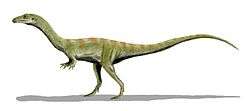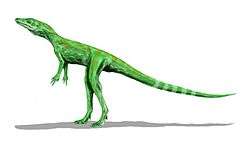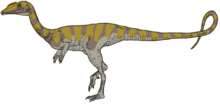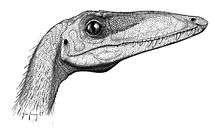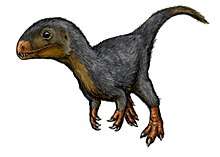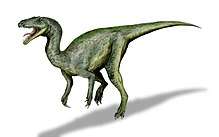List of archosaurs of the Chinle Formation
The Chinle Formation is an Upper Triassic continental geologic formation in the western United States which has yielded fossils of many archosaurs: a group of vertebrates that includes crocodiles, pterosaurs, dinosaurs (including birds), and other extinct relatives.
Crurotarsans
Aetosaurs
Color key
|
Notes Uncertain or tentative taxa are in small text; |
| Aetosaurs of the Chinle Formation | ||||||
|---|---|---|---|---|---|---|
| Genus | Species | State | Member | Abundance | Notes | Images |
|
A. geoffreyi[1] |
|
Known from a handful of isolated osteoderms.[1] |
A controversial taxon that some paleontologists have considered to be juvenile Desmatosuchus haplocerus scutes.[1] However, Randall Irmis notes that the Acaenasuchus scutes have unique characters.[1] Some earlier workers attributed these characters to the allegedly young age of the specimens.[1] However, Irmis notes that the ontogenetic stage of the specimens has not been confirmed and that in aetosaur genera with known juvenile remains, there are no appreciable physical differences between the younger and older individuals.[1] Irmis suggested that future researchers treat Acaenasuchus as its own taxon until contrary evidence surfaces.[1] |
| ||
| Adamanasuchus | A. eisenhardtae |
|
|
|||
|
D. spurensis[3] |
|
|||||
|
D. smalli[4] |
|
|
||||
|
R. chamaensis |
|
Although originally referred to Desmatosuchus, Randall Irmis considers it to be a new taxon closely related to Paratypothorax based on a phylogenetic analysis performed on the remains by Parker in 2003.[5] | ||||
|
P. andressorum[6] |
|
A significant number of researchers feel that the North American material referred to the German Paratypothorax species P. andressorum by Hunt and Lucas in 1992 is actually distinct.[6] | ||||
|
Indeterminate[7] |
|
|
||||
|
C. wellesi[9] |
|
Common in the lower strata of the Chinle Formation, although "[n]on-armor material is comparatively rare".[9] |
||||
|
Indeterminate[10] |
|
|
A partial skeleton from Petrified Forest National Park is not only the uppermost occurrence of Stagonolepis in the park, but may represent a new species as well.[10] | |||
| Scutarx[11] | S. deltatylus[11] |
|
|
|||
| Stenomyti | S. huangae |
|
|
|||
|
T. coccinarum[12] |
|
Common in the Owl Rock and Petrified Forest Members.[12] |
Almost all of the known Chinlean Typothorax fossils are isolated whole or fragmentary osteoderms.[12] | |||
Crocodylomorphs
| Crocodylomorphs of the Chinle Formation | ||||||
|---|---|---|---|---|---|---|
| Genus | Species | State | Member | Abundance | Notes | Images |
|
H. agilis[13] |
|
| ||||
|
P. mccreai[14] |
|
|||||
Phytosaurs
| Phytosaurs of the Chinle Formation | ||||||
|---|---|---|---|---|---|---|
| Genus | Species | State | Member | Abundance | Notes | Images |
|
L. crosbiensis[15] |
|
|||||
|
S. adamanensis[15] |
|
Known from a single skull |
Previously referred to Leptosuchus, actually referable to Smilosuchus.[17] |
| ||
|
S. gregorii |
|
|
Known from a handful of skulls. |
A basal leptosuchomorph. |
| |
|
S. lithodendrorum[17] |
|
|
Known from only one skull. |
Previously considered synonymous with S. adamanensis. |
||
|
cf. Paleorhinus[18] |
Indeterminate[18] |
|
|
|||
|
M. buceros[19] |
|
|||||
|
M. mccauleyi[19] |
|
|||||
|
M. pristinus[19] |
|
|||||
| Pravusuchus[20] | P. hortus |
|
|
|||
| Protome | P. batalaria |
|
|
| ||
|
R. gregorii[21] |
Long and Murray considered Redondasaurus to be synonymous with Pseudopalatus,[16] but other workers have found in to be distinct.[22] | |||||
Paracrocodylomorphs
| Paracrocodylomorphs of the Chinle Formation | ||||||
|---|---|---|---|---|---|---|
| Genus | Species | State | Member | Abundance | Notes | Images |
|
S. inexpectatus[23] |
|
| ||||
|
E. okeeffeae |
|
|
A six-foot-long shuvosaurid | |||
|
P. gracilis[24] |
|
|||||
|
P. kirkpatricki[25] |
|
|||||
|
Indeterminate[26] |
|
|
||||
|
V. haydeni[27] |
|
|
||||
Other crurotarsans
| Misc. Crurotarsans of the Chinle Formation | ||||||
|---|---|---|---|---|---|---|
| Genus | Species | State | Member | Abundance | Notes | |
|
R. callenderi[29] |
|
|
||||
|
R. hunti[30] |
|
|
||||
Dinosauriformes
Basal dinosauriforms
Color key
|
Notes Uncertain or tentative taxa are in small text; |
| Basal Dinosauriforms of the Chinle Formation | ||||||
|---|---|---|---|---|---|---|
| Genus | Species | State | Member | Abundance | Notes | Images |
| Dromomeron | D. romeri |
|
|
A lagerpetid found at several quarries at Ghost Ranch |
| |
|
E. baldwini |
|
|
A dinosauriform closely related to the Polish genus Silesaurus.[32] |
|||
Dinosaurs
Saurischians
Sauropodomorphs
Prosauropod tracks are present in the Redonda, Sloan Canyon, and Sheep Pen Sandstone formations. Possibly the Rock Point Formation as well. Geographically, the tracks are present in New Mexico.[31]
Theropods and near-relatives
Indeterminate ceratosaurian remains have been recovered from the Bull Canyon Formation in New Mexico.[31] Theropod tracks have been found in Utah and New Mexico recovered from the Redonda, Sloan Canyon, and Sheep Pen Sandstone formations.[31] Indeterminate theropod remains are stratigraphically present in the Santa Rosa, Petrified Forest, Bluewater Creek, Rock Point, and Garita Creek formations. They are geographically present in New Mexico.[31] Indeterminate herrerasaurid remains stratigraphically present in the Bull Canyon Formation and geographically present in New Mexico.[31]
| Theropods and near-relatives of the Chinle Formation | ||||||
|---|---|---|---|---|---|---|
| Genus | Species | State | Member | Abundance | Notes | Images |
|
C. arizonensis[31] |
|
|
A coelophysine coelophysid |
| ||
|
C. bryansmalli[31] |
A herrerasaur | |||||
|
C. bauri |
|
|
||||
| C. sp.[34] |
|
|
Originally assigned to C. bauri, is likely a different taxon.[34] | |||
|
C. longicollis[31] |
|
|
Now considered a junior synonym of C. bauri. | |||
|
C. willistoni |
|
|
Now considered a junior synonym of C. bauri. | |||
|
D. chauliodus |
|
|
A basal theropod | |||
|
G. quayi[31] |
|
|
A coelophysoid | |||
|
T. hallae |
|
A basal theropod | ||||
See also
Footnotes
- 1 2 3 4 5 6 7 8 9 10 11 12 "Vertebrate Fauna; Stagonolepididae; Acaenasuchus geoffreyi," Irmis (2005) pp. 75-77
- ↑ "Vertebrate Fauna; Stagonolepididae," Irmis (2005) p. 75
- 1 2 3 4 5 "Vertebrate Fauna; Stagonolepididae; Desmatosuchus haplocerus," Irmis (2005) p. 75
- 1 2 3 "Vertebrate Fauna; Stagonolepididae; Desmatosuchus smalli," Irmis (2005) p. 75
- 1 2 3 4 "Vertebrate Fauna; Stagonolepididae; "Desmatosuchus" chamaensis," Irmis (2005) p. 75
- 1 2 3 4 "Vertebrate Fauna; Stagonolepididae; Paratypothorax sp.," Irmis (2005) p. 78
- 1 2 3 "Vertebrate Fauna; Stagonolepididae; 'Paratypothorax sp.' and 'Paratypothorax-Like Forms'," Irmis (2005) p. 78
- ↑ "Vertebrate Fauna; Stagonolepididae," Irmis (2005) p. 77
- 1 2 3 4 5 6 "Vertebrate Fauna; Stagonolepididae; Stagonolepis wellesi," Irmis (2005) p. 77
- 1 2 3 4 "Vertebrate Fauna; Stagonolepididae; Stagonolepis sp." Irmis (2005) p. 77
- 1 2 3 4 Parker, William G. (2016-01-21). "Revised phylogenetic analysis of the Aetosauria (Archosauria: Pseudosuchia); assessing the effects of incongruent morphological character sets". PeerJ. 4. doi:10.7717/peerj.1583. ISSN 2167-8359. PMC 4727975. PMID 26819845.
- 1 2 3 4 5 6 7 8 "Vertebrate Fauna; Stagonolepididae; Typothorax coccinarum," Irmis (2005) pp. 77-78
- 1 2 3 4 5 6 "Vertebrate Fauna; Crocodylomorpha; Hesperosuchus agilis," Irmis (2005) pp. 79-80
- 1 2 3 4 5 "Vertebrate Fauna; Crocodylomorpha; 'Parrishia mccreai,'" Irmis (2005) pp. 80-81
- 1 2 3 4 5 6 7 8 9 10 11 "Vertebrate Fauna; Parasuchia; Leptosuchus adamanensis, L. crosbiensis, and L. gregorii," Irmis (2005) p. 72, 74
- 1 2 3 4 5 6 7 Long, R.A. and Murray, P.A. 1995. Late Triassic (Carnian and Norian) Tetrapods from the Southwestern United States. New Mexico Museum of Natural History and Science Bulletin 4. pp. 254.
- 1 2 Michelle R. Stocker (2010). "A new taxon of phytosaur (Archosauria: Pseudosuchia) from the Late Triassic (Norian) Sonsela Member (Chinle Formation) in Arizona, and a critical reevaluation of Leptosuchus Case, 1922". Palaeontology 53 (5): 997–1022. doi:10.1111/j.1475-4983.2010.00983.x.
- 1 2 3 4 "Vertebrate Fauna; Parasuchia; 'Paleorhinus sp.'" Irmis (2005) p. 72
- 1 2 3 4 5 6 7 8 9 10 11 12 13 14 15 16 "Vertebrate Fauna; Parasuchia; Pseudopalatus pristinus, P. buceros, and P. mccauleyi," Irmis (2005) p. 74-75
- ↑ Stocker, Michelle R. (2010-09-01). "A new taxon of phytosaur (Archosauria: Pseudosuchia) from the Late Triassic (Norian) Sonsela Member (Chinle Formation) in Arizona, and a critical reevaluation of Leptosuchus Case, 1922". Palaeontology. 53 (5): 997–1022. doi:10.1111/j.1475-4983.2010.00983.x. ISSN 1475-4983.
- 1 2 Hunt, A.P. and Lucas, S.G. 1993. A new phytosaur (Reptilia: Archosauria) genus from the uppermost Triassic of the western United States and its biochronological significance. In; The Nonmarine Triassic, Lucas and Morales, eds., New Mexico Museum of Natural History and Science Bulletin 3.
- ↑ Hungerbühler A. 2002. The Late Triassic phytosaur Mystriosuchus westphali, with a revision of the genus. Palaeontology 45 (2): 377-418
- 1 2 3 4 5 6 "Vertebrate Fauna; Poposauridae; 'Chatterjeea elegans,'" Irmis (2005) p. 79
- 1 2 3 4 5 "Vertebrate Fauna; Poposauridae; Poposaurus gracilis," Irmis (2005) p. 79
- 1 2 3 4 5 6 7 8 "Vertebrate Fauna; 'Rauisuchidae'; Postosuchus kirkpatricki," Irmis (2005) p. 78
- 1 2 3 4 "Vertebrate Fauna; 'Rauisuchidae'; 'Saurosuchus sp.,'" Irmis (2005) p. 78
- 1 2 3 4 Emily J. Lessner; Michelle R. Stocker; Nathan D. Smith; Alan H. Turner; Randall B. Irmis; Sterling J. Nesbitt (2016). "A new rauisuchid (Archosauria, Pseudosuchia) from the Upper Triassic (Norian) of New Mexico increases the diversity and temporal range of the clade". PeerJ. 4: e2336. doi:10.7717/peerj.2336.
- ↑ "Vertebrate Fauna; Pseudosuchia; 'Revueltosaurus callenderi' and 'Revueltosaurus hunti,'" Irmis (2005) pp. 71-72
- 1 2 3 "Vertebrate Fauna; Pseudosuchia; Revueltosaurus callenderi," Irmis (2005) pp. 71-72
- 1 2 3 "Vertebrate Fauna; Pseudosuchia; Revueltosaurus hunti," Irmis (2005) p. 72
- 1 2 3 4 5 6 7 8 9 10 11 12 13 14 15 16 17 18 19 20 21 22 23 24 25 26 27 Weishampel, David B; et al. (2004). "Dinosaur distribution (Late Triassic, North America)." In: Weishampel, David B.; Dodson, Peter; and Osmólska, Halszka (eds.): The Dinosauria, 2nd, Berkeley: University of California Press. Pp. 518–521. ISBN 0-520-24209-2.
- ↑ See Nesbitt et al. (2005) and Ezcurra (2006).
- 1 2 Zeigler, K. E.; Kelley, S.; Geissman, J. W. (2008). "Revisions to stratigraphic nomenclature of the Upper Triassic Chinle Group in New Mexico: New insights from geologic mapping, sedimentology, and magnetostratigraphic/paleomagnetic data". Rocky Mountain Geology. 43 (2): 121–141. doi:10.2113/gsrocky.43.2.121.
- 1 2 3 4 "Vertebrate Fauna; Pseudosuchia; Revueltosaurus callenderi," Irmis (2005) p. 81
References
- Ezcurra, M.D. (2006). "A review of the systematic position of the dinosauriform archosaur Eucoelophysis baldwini Sullivan & Lucas, 1999 from the Upper Triassic of New Mexico, USA." Geodiversitas, 28(4):649-684.
- Irmis, R. B. 2005. The vertebrate fauna of the Upper Triassic Chinle Formation in northern Arizona. p. 63-88. in S.J. Nesbitt, W.G. Parker, and R.B. Irmis (eds.) 2005. Guidebook to the Triassic formations of the Colorado Plateau in northern Arizona: Geology, Paleontology, and History. Mesa Southwest Museum Bulletin 9.
- Nesbitt, S.J., Irmis, R.B., and Parker, W.G. (2005). "A critical review of the Triassic North American dinosaur record." In Kellner, A.W.A., Henriques, D.D.R., & Rodrigues, T. (eds.), II Congresso Latino-Americano de Paleontologia de Vertebrados, Boletim de Resumos. Rio de Janeiro: Museum Nacional/UFRJ, 139.
- Sues, H.-D., Nesbitt, S. J., Berman, D. S., and A. C., Henrici. 2011. A late-surviving basal theropod dinosaur from the latest Triassic of North America. Proceedings of the Royal Society B. doi:10.1098/rspb.2011.0410
- Weishampel, David B.; Dodson, Peter; and Osmólska, Halszka (eds.): The Dinosauria, 2nd, Berkeley: University of California Press. 861 pp. ISBN 0-520-24209-2.

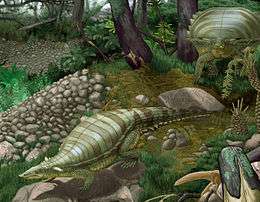





.jpg)

